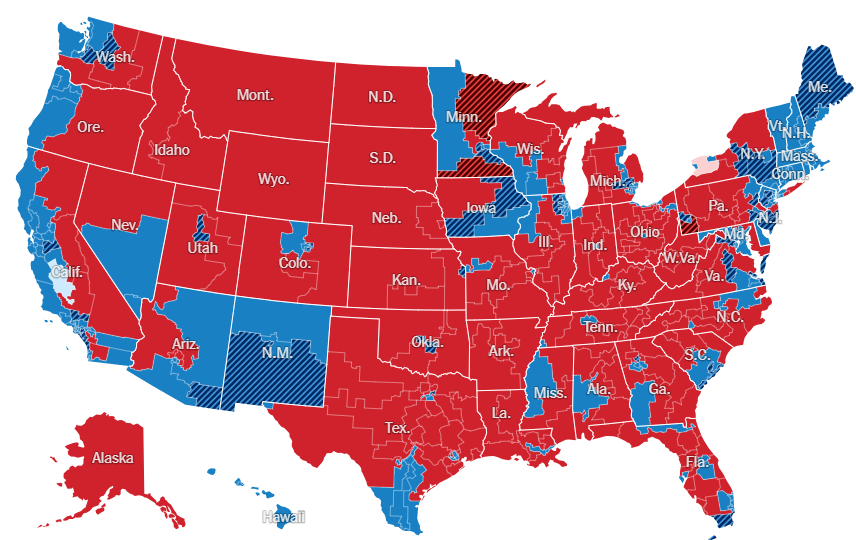A post-mortem on the 2018 midterm elections
The outcome of last month’s contentious midterm elections—with wins and losses for both parties—invites a broad spectrum of conclusions about what motivated voters and how the new balance of power will impact government.
Democrats gained control of the House of Representatives, a widely anticipated outcome due to President Trump’s consistently low approval ratings, which weakened vulnerable Republican candidates. While Democratic gains, 40 seats, closely aligned with historical precedent for the opposing party, the geographical centralization of Republican losses indicated a consistent trend in voter attitude towards Republicans (The New York Times). Unlike previous years, almost all lost seats belonged to Republicans in districts with affluent suburbs, once a Republican stronghold. In Orange County, California, one of the largest Republican-leaning suburbs, Republicans lost every single one of their congressional seats, despite previously holding four out of six of the county’s congressional districts (POLITICO).
The magnitude of Republican suburban losses reaffirms a common observation from pollsters and political analysts: conservative suburban voters have largely rejected Trump. Some theorize that presidential blunders surrounding race, immigration, and other sensitive social issues may be to blame, while others observe that Republicans may have alienated voters with certain policy priorities such as overturning the Affordable Care Act.
“This election was ruled by healthcare,” senior Kees Wybenga said. “We started to see Republican candidates in different positions of national government, even local governments, market a different view on healthcare than they had before…. Republican healthcare bills in both the House and the Senate really focused on combating Obamacare, especially for… pre-existing conditions.”
Republicans’ botched 2017 attempt to repeal Obamacare never explicitly targeted pre-existing conditions. Both the Senate and House versions of an ACA repeal bill explicitly forbade insurers from refusing service for pre-existing conditions, but the bill promoted by House Republicans did allow states to waive pre-existing condition protections if they could prove it would significantly reduce insurance premiums, enabling a potent Democratic line of attack that cast doubt upon Republicans’ support for people with pre-existing conditions (Wall Street Journal).
The muddled Republican messaging towards pre-existing conditions ultimately proved fatal to many congressional Republicans. According to exit polls, 41% of voters described healthcare as their greatest issue of concern (NBC News), and many of those voters likely cast their ballots for Democrats.
Gun control may also have significantly swayed voters towards Democrats. In the House, 15 Republicans with “A” ratings from the NRA were replaced by Democratic candidates with “F” ratings from the NRA (Wall Street Journal). Given that 66% of registered voters supported “stricter gun control” following the Parkland shooting (Quinnipiac), it is highly possible that a significant segment of those voters broke for Democrats, who prioritized reform and denounced NRA lobbying.
Republican officeholders in Oregon experienced major defeats as well. In the election for Washington County Commission chair, Republican Bob Terry lost to Democrat Kathryn Harrington, shifting the commission from Republican control. One of the most prominent Republicans in the state legislature, Representative Julie Parrish, also lost her West Linn seat after being vilified as the driving force behind Measure 101, which targeted funding for the Oregon Health Plan.
However, the 2018 midterms certainly weren’t a complete failure for Republicans. In the Senate, where almost all of the competitive races involved vulnerable red-state Democrats, rural voters broke heavily for Republican candidates and increased the Republican majority by a net gain of two seats. Democratic senators Joe Donnelly of Indiana, Heidi Heitkamp of North Dakota, Claire McCaskill of Missouri, and Bill Nelson of Florida all lost their seats to Republican challengers (Washington Post).
In states like North Dakota and Indiana, where manufacturing and farming feature prominently in the states’ economies, Trump’s “America First” rhetoric and aggressive tariff protections for American manufacturers resonated strongly with disaffected rural voters. Perhaps most significantly, the Kavanaugh showdown provided unexpected momentum for Republicans.
“Specifically to the Senate, I think [Democratic losses] are indicative of the fact that Democrats stalling the Kavanaugh confirmation seemed to have ignited Republican partisanship [due to] the fact that they feel… that Kavanaugh should have been confirmed right away,” junior Parthav Easwar said.
With the looming reality of a divided government in 2019, any successful policy pursuits will have to become bipartisan, a high standard in an era of intense partisan gridlock.
“The system was built in the spirit of compromise, [but] you can make some arguments that we’re at a more confrontory standpoint,” AP Comparative Government teacher Mr. Hahn said. “The question really becomes: how, if at all, can we return to that spirit of compromise, or is nothing going to get done for the next two years?”
Though most hot-button issues fall on partisan lines, a few reforms have been championed by both parties: paid family leave, lowering prescription drug prices, and criminal sentencing reform all leave opportunity for legislative compromise.

Shawna Muckle, 17, is a senior at Jesuit High School. She has been a member of the Chronicle staff for three years in various capacities, and she is currently one of its chief editors. Shawna is fascinated by politics and government, and she enjoys writing articles for the Chronicle pertaining to local and national political developments, alongside issues tied to social justice and personal identity. Some of her favorite pieces she’s written include a feature on Jesuit students’ experience with microaggressions, a recap of the 2018 midterm elections, and an article discussing last year’s clerical abuse scandal within the Catholic Church. Outside of journalism, Shawna is the leader of Jesuit’s Model United Nations club and a member of her school’s Ethics Bowl team, which was a 2019 national champion. Shawna is also a Precinct Committee Person for the Washington County Democrats. In her free time, Shawna can be found aggressively running up hills, drinking boba, and yeeting off on road trips to Seattle (for unspecified reasons). Ask her about her opinions on Congress, specifically a) Republicans and b) the crisis with the federal deficit. In the future, Shawna hopes to pursue journalism in college and, later on, as a congressional reporter in DC.



